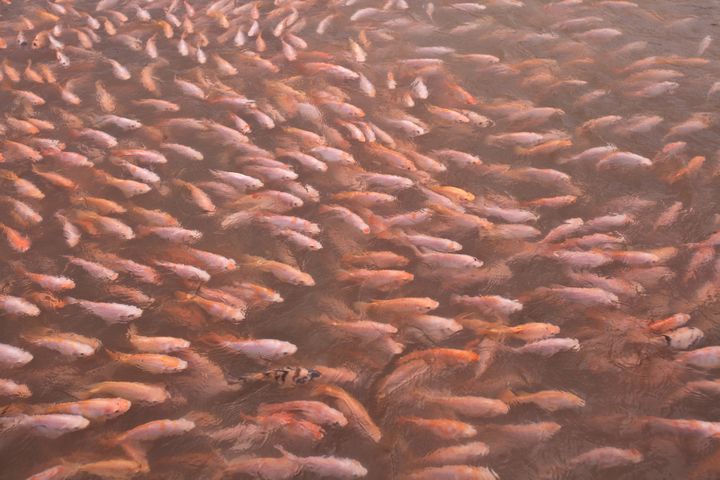
Overfishing, pollution, and climate destabilization have resulted in serious decline of fish populations across the world's oceans. Demand for wild fish meal and oil is a major factor in overfishing, a demand that is, rather ironically, driven by the aquaculture industry (the raising of domesticated fish and shrimp.) Seven of the world’s top ten fisheries target “forage” level fish, 90 percent of which are processed into fishmeal and fish oil used in aquaculture feeds. This process of turning wild seafood from the oceans into ingredients for farmed seafood is simply not sustainable. For the aquaculture industry to continue to thrive, we must find alternative ingredients.
What is more, forage (or “low trophic”) level fish and krill are the wild food for highly desirable deep and cold water food fish such as tuna, salmon, and cod. Additionally, critical apex ocean predators, such as dolphins, whales, sharks, seals, sea lions, penguins and other seabirds are also highly dependent on these fish and krill populations. Declines in volume of this vital feedstock is the likely cause behind starving sea lion colonies and highly endangered Brown Pelicans failing to nest successfully. No matter the efficiency of fisheries and aquaculture operations, additional ingredients and cost effective formulations are absolutely necessary if the industry is to become sustainable in the long-term, and compete with beef, poultry and pork.
From these issues, the F3 Fish-Free Feed Challenge was born -- and this is where the innovation comes in! The challenge is for an aquaculture feed company to produce and sell 100,000 metric tons (mt) of seafood-free feed using inventive and effective formulations that provide sufficient nutrients for the farmed species. In doing so, these formulations can be produced and marketed world-wide, in order to reduce pressure on the world's fish populations and increase industry sustainability.
If fish meal and oil is limiting the future, what do we need to substitute to ensure continued stability for aquaculture? There are alternative answers out there, but which ones will prove the most successful? The F3 prize's goal is to showcase aquafeed companies making a concerted effort to do the right thing, which is taking strides toward more sustainable aquafeeds. Sales are only possible if the company has created commercially viable alternatives in cost and quality, such that, once in high-volume production the feeds would experience rapid and seamless adoption.Eventually, the hope is that these innovations lead to a new consumer product category, the equivalent of 'grass-fed seafood', where seafood that is innovative and more environmentally friendly receives special attention.
The Prize
The prize will go to the first company that sells 100,000 mt of seafood-free aquaculture feed OR to the company that has sold the most seafood-free aquaculture feed by the Challenge end date, October 5, 2017, verified by the judging committee. A single prize of the total funds pledged through crowdsourced efforts will be awarded to the first company that meets the winning criteria.
Companies can register as competitors at the F3 Fish-Free Feed Challenge page. You'll be kept up-to-date on any developments, be able to see the details of the challenge criteria and guidelines, relevant news and information to the field, and be part of a community of other innovators interested in entering the challenge, as well.








